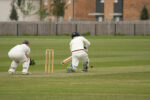Mental Health and international cricket

When International Cricket resumed last year in July, after an unprecedented Pandemic break that shut down the World, the West Indies, were the first touring side to brave a still mostly- shut, Covid- hit world to travel to foreign shores and resume cricket on grounds that had lain silent and bare for months.
Post Pandemic, International Cricket has been played inside Bio Secure Bubbles, where players, officials, support staff and everyone else connected with the conduct of matches are isolated from the rest of the world, at on-site hotels at the grounds.
Everyone, including the hospitality and broadcast staff are tested and if found free from the dreaded virus, admitted and confined to their own individual Bubbles. And there they remained, shut away till all the games were completed, with no outside mingling or social contact allowed. This system has worked well for the Cricketing Community ever since and as the Pandemic eased, some of the restrictions were gradually relaxed, but it still largely remains a very isolated existence.
The teams trained alone in cordoned-off stadiums, a long way off from the bright lights and away from constant media glare, emerging from behind the cordons and the quarantine only to play at eerily quiet stadiums with rows and rows of neatly folded back seats. Gradually, over time, the crowds have been allowed back in, but the scare of infection is still never very far away.
All this has created unprecedented demands on the mental health of players and teams have requested for psychologists and motivational trainers to handle the associated mental challenges.
Last year, England’s World Cup winning Captain Eoin Morgan first spoke out about the potential mental health hazards for cricketers who spend long periods in isolation and said that teams should henceforth expect – even encourage – some players to miss tours and take breaks, away from the environment of isolation and link up with friends and families, periodically. For his own team, he sought to create a culture where players would feel free to step away from tours, if they thought it was affecting their mental health.
However, with the kind of money that is on offer and the ever-present competition for places, such decisions may be difficult for players to make, keeping in mind that cricketing careers at the highest level can often be brief. Quite a few top international cricketers are however, increasingly taking that call now, Australia’s Mitchell Starc and England’s Chris Woakes being two recent examples who bypassed the riches of the IPL, to ‘recharge their batteries.’
Starc, alongwith former team mate and fellow member of the ‘150 K Express Speedsters Club’ Mitchell Johnson, spoke out openly about the psychological effects of living in isolation in the constant glare of public scrutiny and criticism. Johnson, the fifth highest wicket taker in Australian cricketing history, poignantly described how the criticism by fans and media would constantly resonate in his head, causing his game and self-belief to disintegrate, as he brooded on it in lonely hotel rooms, away from his family and normal life.
Starc said much the same thing, about his own sub -par performance on India’s last tour of Australia. He vowed not to let ‘the Noise get to him’ again, choosing to quietly prepare for upcoming Test Matches in the laid- back atmosphere of the Sheffield Shield and the NSW team nets – a world away from the spotlight of the Indian Premier League. Another Australian star Glenn Maxwell, had similarly taken a break on mental health issues in the recent past, before successfully returning to the Australian side last year.
Coming from tough, superbly skilled, successful athletes, these admissions are an eye-opener of what the best international cricketers go through mentally, when things are not going well. Similar psychological pressures had ended prolific England opener Marcus Trescothick’s Test career some years ago and caused another England batsman Jonathan Trott, to return home midway through an Ashes tour.
England woman cricketer Heather Knight recently spoke about the feeling of participating in “a weird social experiment” with regard to bubble stays and quarantine in hotel rooms and likened it ‘being in a prison with a knock at the door three times a day with our meals.’ And these were the only times they were allowed to open their hotel room doors during the ‘hard quarantines.’




And it can be even worse for players who are not doing well, to be stuck in such isolation for extended periods when the necessary emotional support system from friends and family is often non- existent. This is even more relevant in a sport that tends to wallow in a false sense of failure. As Knight added, ‘When you bat, if you don’t score a 50 or a 100, you sometimes think you’ve failed.’
It takes a different kind of mental strength to survive such a monk-like hotel- ground – hotel existence. Quite different from the one needed to play Test cricket competitively. While introverted, self- driven individuals may possibly handle it better, it is easy to imagine that the outgoing, gregarious extroverts who largely draw their energy and motivation from the environment, may struggle to cope after a while.
The new Rotation Policy followed by the ECB is one solution where players have been continuously rotated at scheduled intervals, although it has not been without its fair share of controversy.
England players are now demanding clarity on quarantine rules for themselves and their families before committing to the Ashes tour this winter. As thigs stand, some of them could only be available for just three out of the five Tests in Australia.
In a major blow to England’s cricketing hopes recently, star cricketer Ben Stokes pulled out of all forms of cricket indefinitely, to concentrate on healing his mental issues arising out of the death of his father and aggravated by long bubble stays in different parts of the world.
To this difficult situation has now been added the worry of possible Covid outbreaks even within the Bio-secure bubbles, something that has been happening with increasing frequency of late. Tours have been cancelled midway, almost entire teams have been replaced by a fresh set of players and teams have cooled their heels in a foreign country for over a month of no cricket, waiting for a series to begin. We live in fast changing times – and what was unthinkable a year back, is a reality today!
So far however, not much has been heard from Cricketers from the subcontinent about such issues, although they would be equally affected, given the near continuous ICC cricketing calendar. At least 4 Indian cricketers Md Siraj, the Pandya brothers and Chetan Sakariya have lost their fathers during ongoing cricketing commitments in the recent past and chosen to continue playing. Skipper Virat Kohli himself had launched his First-Class career for Delhi under similar circumstances some years ago. A list of cricketers who have played the most number of international matches away from home during the pandemic shows that eight of the top ten players are Pakistanis. Pakistan have also played the most International games during this period. England have played less than half that number.
And yet there are no voices of concern on mental health, or even rotational policies emanating from Pakistan yet.
Does that imply then, that mental health issues are not being looked at seriously in these countries and are being largely brushed under the carpet? Or are Indian, Pakistani and Sri Lankan players scared to voice their problems lest they lose their places in their respective national sides – with its associated financial losses? Speaking out about bubble fatigue, or voicing concerns about mental well-being could potentially mean risking their place in the national side for these players.
Or is it that players from this part of the world are simply tougher mentally and more used to adversity, given the challenges that the average Indian or Sri Lankan, or Pakistani faces on a daily basis, in their everyday lives? Not to forget the social stigma and sense of weakness that is still attached to anyone confessing to having mental issues in these countries.
Could it be a potential crisis waiting to explode on the cricketing world in times to come? And if so, how long would it be before the responsibility of taking care of the mental health of Cricketers devolves on their respective Cricket Boards and is effectively written into their contracts with the Boards?
And how long before the first case of a player suing his Board for failing to do so?
Whichever way, is it something that could have serious repercussions later, in terms of possible burnout and/ or emotional breakdowns of players at the peak of their cricketing abilities?
This is undoubtedly one issue that the International cricketing community needs to take serious note of – and find ways to address.
The sooner the better.






